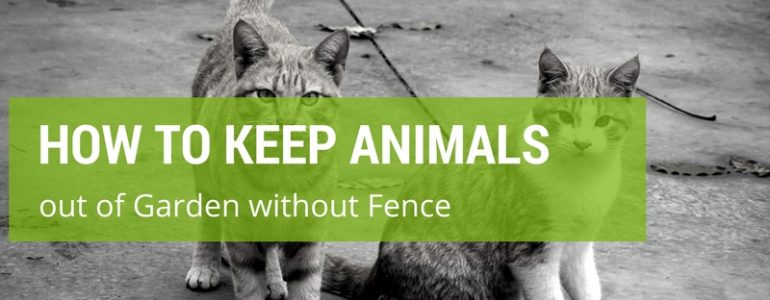When you have a pleasant lawn and garden, it’s only natural that some wildlife will be attracted to it. Wild creatures such as deer, raccoons, possums, squirrels and rabbits are fun to watch, and while you may want to provide them with some food and shelter, you probably don’t want to open your veggie garden to them.
In this article, I share a dozen humane tips to help you enjoy your backyard wildlife while protecting your veggies without building a garden fence. So, how to keep animals out of garden without fence? Read on to learn more.
How To Keep Animals Out Of Your Garden
1. Coffee grounds
Sprinkle coffee grounds around your plants. Cats, slugs and snails dislike coffee grounds, and as the grounds decompose, they add nitrogen to your soil. If you don’t drink a lot of coffee at home, you can often pick up a free bucket of coffee grounds from a local café or coffee shop.
2. Scare with hair
If you trim your hair at home, you can just toss the trimmings out in the garden or bag them up in old nylon stockings to hang around the garden. Wild animals don’t like the smell of human hair (especially unwashed). If you need lots of hair, check in with a local beauty shop or barber to see if they’ll let you carry their clippings away.
3. Dried blood meal
You can purchase a bag of dried blood meal very reasonably from your local garden shop. Scattered about on the ground in your garden, blood meal adds nitrogen to the soil and repels many herbivores. Be careful not to allow blood meal to come in contact with stems or leaves of live plants because it can burn them as it decomposes.
4. Use deodorant soap
Strongly scented, deodorant soap is repellent to deer. You can buy cheap, strong deodorant soap and hang the bars up in net fruit and veggie bags around the garden. The strong, unnatural scent is offensive to deer.
Don’t use natural, organic soaps (especially those containing coconut oil) as this may attract deer and other wildlife.
5. Motion activated sprinklers
Motion activated sprinklers shoot out a strong spray of water when an animal triggers the sensor. These “scarecrow sprinklers” are very effective against some birds, deer and cats, but dogs may enjoy them.
6. Clatter and flashing lights
Raccoons are especially offended by loud noises and bright lights. A combination of bright rattly things (e.g. a mobile made of tin can lids) and/or a bright flood light and loud music can repel raccoons.
7. Scented plants
Strongly scented plants keep insect pests away and may repel some warm blooded animals, as well. Some good examples include:
- Scaredy-Cat Plant (Coleus Canina)
- Various Scented Geraniums
- Citronella
- Tarragon
- Lavender
- Oregano
- Rue
- Dill
8. Use your corncobs
Make good use of your corncobs by soaking them in vinegar and tossing them around the garden. The sharp smell of vinegar is repellent to quite a few ground-dwelling animals (e.g. badgers, hedgehogs, moles, etc). The corn cobs will gradually break down and feed the soil.
9. Chili pepper spray
Make chili pepper spray using red pepper flakes and water. Just boil about a teaspoonful of flakes in a quart of water for about 5 minutes. Be sure to keep the lid on the pot while boiling and until the mixture has cooled down completely. Inhaling the steam or having it contact your eyes can cause injury.
Once the mixture is completely cooled, strain it into a spray bottles and spray it around areas of your garden where you do not want pests. This is also an effective repellent for insect pests.
10. Predator urine
Purchase cruelty-free predator urine from your local garden center. Spray it around the bases of trees and plants to fool your herbivorous garden visitors into thinking you have a local fox, mountain lion or coyote. You can also soak cloth or cotton in the urine and place the sodden material strategically around your garden.
11. Plant diverse crops
Avoid mono-crops and keep your plants healthy so that they will naturally deflect pests. Fewer insect pests in your garden adds up to fewer insect pest predators in your garden.
12. Divert your unwanted visitors
Plant a wildlife garden away from your own veggie garden. Many people do this by tossing out seed or planting extra or unwanted plants near the compost heap or in some other out-of-the-way place. You can purchase seed for a deer meadow very affordably at camping stores or online. A natural, perennial, wild plant garden attracts beneficial wildlife and helps keep your own veggies safe.
- Read also: How To Get Rid Of Bees Without Killing Them
Final Words
As with all natural alternatives to pest repellents, these methods work best in combination with one another. Reapply and refresh natural repellents frequently (especially after a rain). Use several methods at a time, and rotate your methods periodically to keep your wild visitors on their toes!
If you find out that none of these really works for you, you can always invest into more sophisticated repellents, e.g. scarers and traps.







